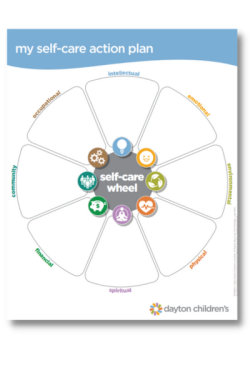4/20/23 blog post
from surviving to thriving: how self-care can help you overcome stress
use this free worksheet to strategize your self-care

Download the Self-Care Wheel worksheet to focus on self-care today.
Spring is here, and with it comes warmer weather, blooming trees, and or some educators, added stress and pressure, as the end of the school year approaches. If summer break seems just out of reach, this is your sign to remember that taking care of yourself is essential for being able to care for others.
We want you to give the world what’s best of you and not just what’s left of you!
Stress is a natural part of life, but if left unchecked, it can have serious physical, mental, and emotional effects. Some physical symptoms of stress include low energy, insomnia, headaches, and frequent illnesses, while emotional symptoms may include difficulty concentrating, feelings of loneliness, and increased irritability or edginess.
“The challenge is to change our mindset,” said Emily. “Turn stress into an opportunity for positive change, a challenge to overcome, and a way to personally grow. As my coworker Sue says, ‘stressed spelled backwards is desserts! It is all in how you look at it!’
So how can we combat stress and take care of ourselves? One important step is to change our mindset and view self-care as a necessity, not a luxury. By taking time to recharge and refuel, we can better serve those around us. Here are some simple self-care activities to try:
- Get creative: Visit a local art studio or make something on your own to get those creative juices flowing.
- Hang out with cats: Check out a cat café for a relaxing and furry experience.
- Take a walk: Enjoy the outdoors by walking around your neighborhood, local park, or nearby trails
- Practice yoga: Attend a local class or find an online option that works for you.
- Connect with a colleague: Meet up for coffee and catch up on things outside of work.
- Start a gratitude journal: Write down three things you're thankful for each day.
- Get enough sleep: Put down your phone and aim for a good night's rest.
- Spend time gardening: Enjoy the therapeutic benefits of tending to plants and being outdoors.
- Read for pleasure: Find a book you enjoy and take some time to unwind.
By incorporating self-care into our daily routines, we can reduce stress, improve our overall well-being, and be better equipped to care for the children in our lives. Remember, self-care isn't selfish – it's necessary. So take some time for yourself this spring and thrive, not just survive.
strategize your self-care with this worksheet
Now that you've got some ideas for self-care, create a strategy plan to prioritize your wellness. Download this Self-Care Wheel printable worksheet, created by Dayton Children's Behavioral Health department, to help guide you. Here's how to use it:
- Fill out each category with at least one idea for how you can practice self-care.
- Whenever you start to feel the effects of stress, pick one of the activities and try engaging in it until you feel the stress slipping away.
- (Optional) Take a photo and share it with the world! Sharing how you do self-care can not only break the stigma surrounding mental health, it can give someone else the permission they need to focus on managing their own stress and mental wellness. You can share your photo by tagging @daytonchildrens on Facebook or Instagram and using the hashtags #OnOurSleeves or #ClassroomChampions



